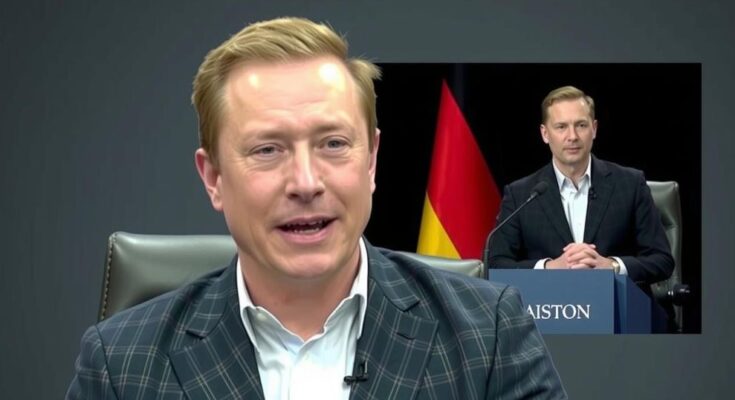Elon Musk livestreamed a discussion with Alice Weidel, leader of Germany’s far-right AfD party, advocating for its support in the upcoming elections. This event raised concerns regarding foreign influence in politics and the role of social media in amplifying extremist views. The conversation touched on various controversial topics, revealing underlying socio-political dynamics in Germany as elections approach.
On January 9, 2025, Elon Musk engaged in a livestreamed interview on X with Alice Weidel, a leader of Germany’s far-right Alternative for Germany (AfD) party, ahead of the national elections. During this event, Musk advocated for voters to support the AfD, criticizing Germany’s high taxes, immigration policies, and the decision to phase out nuclear energy. The discussion, which attracted over 200,000 viewers, raised significant concerns in Europe regarding Musk’s influence on foreign political matters and the promotion of extremist views.
Musk and Weidel underscored the importance of free speech, with Weidel distancing the AfD from Germany’s historical Nazi past, characterizing the party as libertarian. They contrasted their positions with those of Adolf Hitler, whom Weidel insisted was a communist rather than a conservative figure. While the conversation also wandered into lighter subjects, such as the possibility of human life on Mars, Musk previously articulated critical views on Germany’s political landscape and endorsed Weidel’s candidacy, presenting her as a strong political figure despite her party being closely monitored for extremism by the German intelligence agency.
This livestream is not an isolated incident; Musk has consistently leveraged his platform to endorse far-right politics, including past comments supporting controversial figures and criticizing European leadership. His actions have provoked scrutiny from the European Commission, which maintains that platforms like X must adhere to regulations aimed at curtailing the spread of illegal content, particularly hate speech, and misinformation.
The AfD’s rise in popularity can be attributed to growing discontent with the current government and broader European sentiments against immigration and supranational governance. Despite this, the Christian Democratic Union remains favored to lead the elections scheduled for February 23, 2025. The situation reflects a notable shift in European political dynamics, as far-right parties regain traction despite historical stigmas. As the elections approach, the intersection of social media and politics remains a pivotal point of concern in the regulatory landscape.
The Alternative for Germany (AfD) is a far-right political party founded in 2013 that has gained traction by opposing immigration and advocating for national sovereignty. The party has faced scrutiny and has been classified as extreme by Germany’s domestic intelligence agency. Elon Musk, the CEO of Tesla and SpaceX, has increasingly utilized his social media platform, X, to interact with and endorse the AfD, which raises questions about foreign influence in national politics and the ramifications of such endorsements on the political climate in Europe, particularly as elections approach.
The recent livestream of Elon Musk with Alice Weidel highlights a troubling trend of prominent figures using social media platforms to amplify far-right political messages. As elections loom in Germany, the endorsement of the AfD carries implications that necessitate close scrutiny of the intersection between technology, social media and political influence. The growing support for far-right parties in Europe signifies shifting public sentiments which may challenge established political norms.
Original Source: apnews.com




